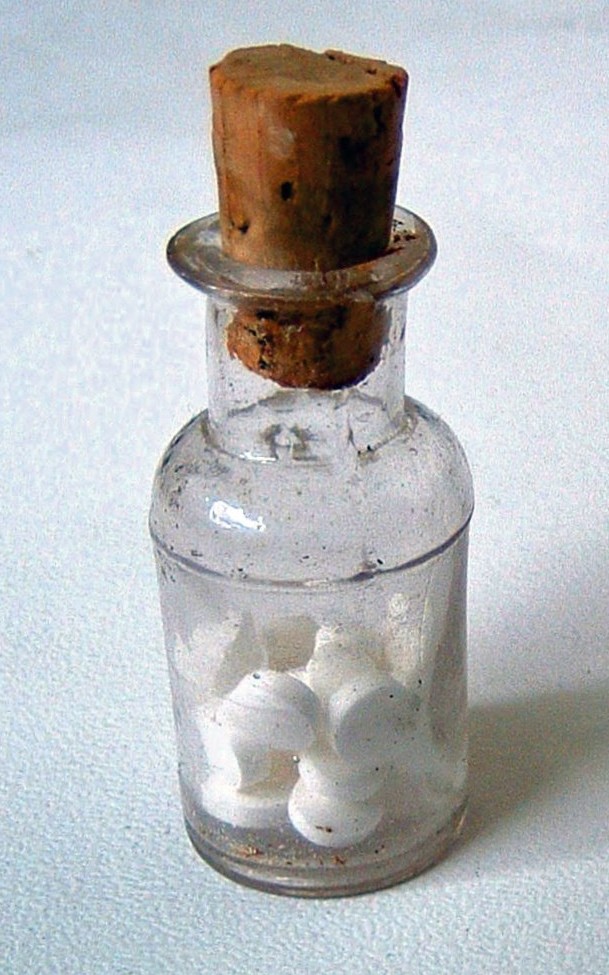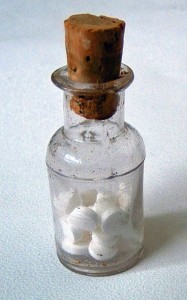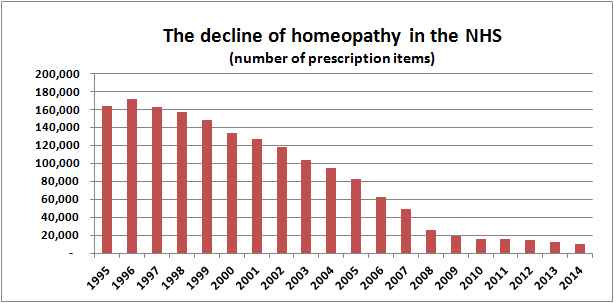
 That the NHS spends money on homeopathy is a red flag to many thinking people. If the publicly funded health service is to operare efficiently and fairly, how is it that it can spend money on this egregious quackery?
That the NHS spends money on homeopathy is a red flag to many thinking people. If the publicly funded health service is to operare efficiently and fairly, how is it that it can spend money on this egregious quackery?
Furthermore, how can campaigns to stop homeopaths exporting their dangerous ideas to people with HIV, Ebola and malaria in African countries counter the claim that ‘the UK government supports homeopathy by incorporating it into the NHS’?
As such, many homeopathy critics have been vocally campaigning about this issue for many years. But now, a legal challenge to the use of homeopathy within the NHS suggests that its days may now be numbered.
The decline in the use of homeopathy in the NHS has been drastic over the pas twenty years. The Nightingale Collaboration has charted the huge drop in prescription items written out by NHS doctors in England.

Up until about 2009, we saw a near catastrophic crash in prescriptions. After that, a more steady decline. Even so, last year saw a 21% drop in volume. Why this shape? It is not clear. But perhaps we have seen the steady decline over two decades of the sort of paternalistic, “Here have a placebo” type doctoring that has been replaced by a more collaborative and evidence based style. What is left is a perhaps a rump of True Believers: doctors who really believe homeopathic sugar pills have specific and useful effects in their own right.
And there is a small rump of such doctors. They tend to cluster around the vestigial stumps of the old Homeopathic Hospitals – clinics in Bristol, London, Liverpool and Glasgow.
The significant news then is that Liverpool Clinical Commissioning Group (CCG) were challenged by lawyers acting for the Good Thinking Society. They argued that it is a duty of local CCGs to ensure NHS funds are spent as effectively and responsibly as possible. Funded treatments need to be rational and evidence-based. Homeopathy is neither.
Liverpool PCT having been funding a small homeopathy clinic. In 2011, I wrote about how the historic Liverpool Homeopathy Hospital had appeared to vanish. It would appear that a homeopathy service continued through a contract as reported by the Faculty of Homeopaths (NHS homeopathy thriving in Liverpool). This ‘thriving’ service is now under direct threat as the CCG reconsiders its position in light of the legal challenge.
Nick Ross, President of HealthWatch has said about this,
At least the grown-ups have finally taken charge and have insisted the decision is reviewed. Let’s hope those with medical training, economic literacy and fiscal responsibility manage to defeat the gullible for whom populism and pseudoscience seems to be of more concern than the health outcome of their communities and patients.
Dr Sarah Wollaston, a GP and former Conservative Party chair of the House of Commons Select Commitee on Health said
There can be no excuse for wasting NHS resources or deliberately deceiving patients with ‘treatments’ which have been shown to have no benefit.
This decision has ramifications across the rest of England and Wales now. All funding groups who still fund homeopathy will have to consider if doing so is legal, or face a challenge.
The Good Thinking Society is not actually funded by Evil Big Pharma – as you might be expected to believe. It is a charity and relies on your donations. They are asking for help now to pay for legal expertise so that this challenge can be applied to other NHS funding groups. It has been suggested you donate £10.23 You may of course wish to donate a little bit more.
It may be very soon that homeopaths will no longer be able to justify their quackery by claiming the NHS pays for it. Let’s make that day happen.


I hadn’t realized that homeopathy was in such decline. I certainly meet many people who believe in it, and indeed become rather angry and aggressive when questioned about it. One of the lamest responses of course being ‘Well you can’t prove that it DOESN’T work’. Fans of this nonsense like to claim that the WHO admits that homeopathy is the fastest-growing system of ‘medicine’ in the world. While omitting the words ‘to their dismay’.
How does one go about stumping up a prize similar to ones offered by Singh, Ernst and Randi? I’d like to put up 10,000 or so.
Forget prizes. Homeopatsh will never submit their beliefs to a fair test.
Donate to this campaign to get proper legal scrutiny of funding decisions.
Of course you’re right. It’s symbolic. But I think it’s important symbolism nonetheless in that it is seen as an easy way to earn thousands of pounds by doing the simple thing of proving something works. The more scurrilous and shifty these people are made to appear, the better for the whole argument against them. I’m sad to say it, but I meet decent, intelligent, educated people all the time who believe this tripe.
As I imagine you do.
The campaign against the shameful Boots company for the ways in which they promote claptrap and wizardry is also very important.
Is it possible to donate by cheque?
I’m in Turkey and my Bank card never turned up so I can’t make transfers.
I have commented on Edzard Ernst’s blog, but may I have the courtesy of the Quackometer to reiterate?
There are two elements to ‘homeopathy’ which should be considered separately:
(i) The practitioner and the practice. Style and substance.
No doubt time spent in a therapeutic relationship with an empathic practitioner helps many patients ‘feel better’.
They might also feel better if NHS funds were spent on them having a new hairdo, a perfume, a ticket to visit the gardens of Highgrove House. The list is endless, as would be the cost of satisfying these desires.
These are type I effects due to placebo.
(ii) The issue for CCGs is whether homeopathic remedies have any type II effects on specific pathological conditions.
So far there is no evidence they do which is why Dame Sally Davies and others have opposed NHS funding for homeopathic remedies.
That is also BMA policy, ‘unless and until NICE reports on the cost-benefit’. (Which would require some type II benefit being demonstrated).
It does not matter how much is spent – no NHS funds should be used without good reason.
The financial situation may focus attention, but that basic principle is always there.
Consideration of ‘classical’ homeopathy, which delineates into two separate elements, leads to the conclusion that there is no such thing as homeopathy… at all. The sugar-pill ‘remedies’ themselves are no more than placebo; the homeopathic ‘individualised’ care is simply… care. And good care can make unwell people feel better. However, homeopaths have no monopoly on claiming origination of the provision of good care (palliative or otherwise), which ought to be separated out from homeopathy and its claims to treating the organic basis of disease.
But the remedies are staunchly, hypocritically clung to. Because without them, homeopathy is nothing. So, if the ‘care’ component includes fermenting the expectation of the dispensation of ‘remedies’, the remedy and care elements cannot be considered separately. Without the promise of these remedies entwined with the attention, the (RCT-evading) individualising component is revealed for what it is – care – and the homeopath is rendered redundant (and its sugar-pill industry collapses).
Care has value.
Homeopaths (without their non-effective remedies) might need to transform into counsellors or carers more generally – even nurses or doctors.
Big Charma (Complementary Health and Alternative Remedy Manufacturers) might have to invent other products to sell.
There would be no fraudulent selling of nothing as something.
I try to avoid ad hominem challenges to homeopaths and concentrate on the remedies.
That is why, when considering any CAM, I differentiate the therapy from the therapist, the camistry from the camist.
Yes – if homeopaths could reject their nonsense shaken water and sugar pills and concentrate on what does have an effect – care – then we might envisage a fuller integration of a caring clinical sub-branch (re-trained nursing and counselling?), of benefit to all patients, and reclaim doing good from deluded do-gooders.
But, like other strongly held delusional beliefs, homeopathy does not cope well with rational criticism. Accepting and admitting that it is all useless, invalid knowledge is impossibly difficult; the implication that it was all an unfounded waste of time is taken as personal insult. So, challenging the ‘remedies’ is inextricable from challenging the homeopath. Without them, they have no job title.
Point well made. I’ve never seen any criticism of homeopathy that doesn’t accept the role of caring and listening. But -as they say- if homeopathy is the answer then what the HELL was the question?
True, but irrelevant.
The CCG has to decide whether or not to spend public funds on remedies for which, to date, have no plausible evidence for worthwhile effect.
‘Caring’ does have an effect.
If deciding not to purchase sugar pills means there is no longer any need for homeopaths (and that they have to re-train as nurses, counsellors, doctors), and that the manufactures have to invent other products, or leave the sector – so be it.
It is not the CCGs responsibility to provide employment, job titles, or profits for manufacturers
The CCG must ration its funds rationally.
Irrelevant? Oh.
In case you read me as arguing that CCGs allocate funding to homeopathy – I certainly do not.
Hahaha… Bad paper published in FACT. I.e.
“On the ethical use of placebos Richard Rawlins”
You cites
“Moskowitz R. For homeopathy: a practicing physician’s perspective. Bioethics 2012; 26: 499–500.”
Sure? The paper does not appear in Bioethics. Moskowitz publish paper in AJHM:
Editors comment: Dr. Moskowitz submitted the following commentary to Bioethics in response to Dr. Kevin Smith’s criticism of homeopathy appearing in that same journal. Bioethics refused to publish it; consequently, we are printing it here. Dr. Irene Sebastian also submitted a response, also denied publication by Bioethics; we anticipate publishing that response in our next issue of AJHM.
Rawlins, your paper is mockery.
If you say so. But then who are you?
Do you know?
I’m not an academic, but should everyday medicine be about good thinking or treating people?
Agreed. Why put up a false alternative?
Please define ‘everyday medicine’and ‘good thinking’.
Er. I could do so as a lay activist.. But, isn’t that your area of expertise and job?
Mr Clark – I am asking you to define the terms you have used.
I am pleased you say you ‘could do so’.
I have never used theose terms and do not understand your posting.
Thank you.
“I’m not an academic, but should everyday medicine be about good thinking or treating people?”
Only by good thinking is it possible to treat people properly.
What’s ‘everyday medicine’?
For me, treatment requires something beyond good thinking. As a lay person, “everyday” means what I can get from a Pharmacist or if required through a G.P. visit. Yet, in my experience such interventions may not always be effective as expected or may have other unanticipated effects.
But the point is that whatever the truth in what you say, the alternative has to have some scientific validity. Homeopaths have had going on 200 years to come up with any evidence, but they haven’t done so. And there’s a reason for that.
You may as well say that since proper medicine has not had the required effect -and one would need to know more about any specific case in order to understand why that may be – then you’re going to see if whacking yourself over the head with a banjo will work. Or eating nothing but Cheezy Wotsits for the next couple of months. Fans of homeopathy are completely immune to the basic fact that there is no evidence at all-apart from the occasional placebo effect-that it works. In that respect it’s a religious construct, not a scientific one.
‘In that respect it’s a religious construct, not a scientific one.’
Yes – like other belief systems, homeopathy relies on something miraculous, and also appeals to the ‘spiritual’. Homeopaths (have to) believe the water and pilules work (otherwise, they’re frauds). Challenge/criticism often provokes reaction with cult-like fervency.
You are absolutely right of course – intervention by a pharmacist or GP may not always be effective and may have side effects. So?
But in the context of this thread David (OK?) did you intend to create a dichotomy: “should everyday medicine be about good thinking or treating people?” (either good thinking OR treating people) That is a false dichotomy.
We can reason and treat – and should do both.
Within the context of this thread, I’m only pointing out that any dichotomy has already been created by activists who claim entitlement to shape public debates. I would agree with those who say that matters of efficacy and side effects require expert judgement. Generally I respect the professional advice of my local community pharmacist.
The number 1 killer at the moment is heart condition and if you actually look and see what the pharmaceutical industry does for people with heart condition its laughable. A homeopathy natural diet based approach brought down angina attacks by 91%. where control group patients had a 186% increase following the advice of their doctor. http://naturalheartburnremediesinfo.blogspot.ca
What you people can not, and simply WILL not, understand is that some of us actually have the intelligence to follow up the sites you recommend and find out what they REALLY say. I haven’t had time to listen to it all yet -there’s nearly an hour I think- but in the text preamble, and in the parts of the lecture I have had time to listen to, including the part early on where he mentions the percentages you quote, the gentleman speaks of a ‘plant-based’ diet, and of the need for exercise and for cutting out manufactured meat products. Homeopathy isn’t even mentioned.
I don’t think you even realize how preposterous you are in your frantic attempts. You’re confused by your own confusion.
Take a look at type 2 diabetes and what the pharmaceutical industry comes up with if you really want to have a laugh!! Only one drug, metformin, has any evidence.
At the end of the day, a decent diet and stopping smoking are far, far more effective than any polypharmacy, when you look at the NNTs.
http://www.thennt.com
I’m still having a laugh at what homeopathy comes up with as a treatment for this or any other condition.
Came across this site by accident looking for a blogspot template. Love it for two reasons. I have a new website using the same template but the content on quackery is brilliant!
looks like a recession representation is shown here.. nothing wrong with that. NHS is cutting funding for many important services.
NHS should invest in Exercise Referral Department (the results have been great) and we need to expand Exercise and Nutrition awareness.
I teach people to become GP Referral qualified regularly and the demand from NHS and local Councils are ok, but could be so much better…